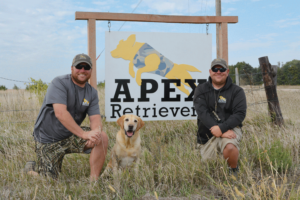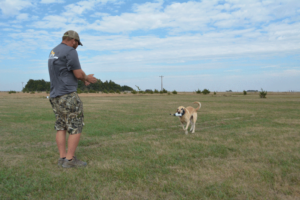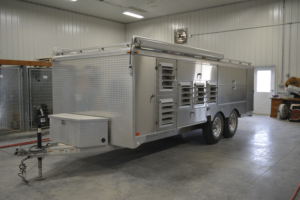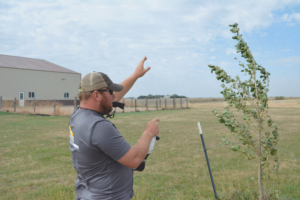
Dane Johnson (left), owner of Apex Retrievers, his dog, Zale, and training assistant Kevin Mansfield. The duo trains more than 40 dogs each year from their facility northeast of Elm Creek.
Breep! “Left!” Breeeeeep! “Right!” Breep, breep, breep! “Here!”
Dane Johnson points to the ground. Between his teeth a large, black whistle gives off a high, piercing sound. In the distance his yellow lab, Zale, stops at the trill of the whistle, turns and looks at his master. Then, he breaks into a sprint toward Johnson and stops at his master’s feet.
“When dogs hunt, 80 percent is with their eyes, the other 20 percent is nose,” Johnson said.
Johnson is a professional dog trainer and owner of Apex Retrievers, located northeast of Elm Creek. Specifically, he trains and tests hunting dogs, and competes nationally with field trial retriever dogs. Field trials are competitive events where canines are judged on style, train-ability, nose, control and marking and memory. It’s all about precision, not speed.
“This all started with the love for bird hunting,” he said. “All I wanted was a great hunting dog. When I discovered modern dog training, it blossomed into this.”
[su_pullquote]When dogs hunt, 80 percent is with their eyes, the other 20 percent is nose. [/su_pullquote]Together with Zale, Johnson learned modern training techniques and what it takes to create a field trial champion. Zale is a well-decorated athlete; a member of the Hunting Retriever Club 1,000 Point Club and a recipient of six Grand Hunting Retriever Champion Grand Passes. These passes are the highest possible hunt test title offered by the United Kennel Club. To Johnson’s knowledge, his dog is within the top three rank for most Grand Passes by a yellow lab.
“It’s amazing this dog turned out into anything,” he chuckled. “We figured out everything together through all the bumps in the road. He’s one in a million.”
Both field trials (called testing) and hunt tests help breeders evaluate their dogs’ bloodlines. Both are fundamentally geared toward producing a better hunting dog by way of developing the dog’s inherent abilities and fine-tuning their training. Hunt tests score dogs individually based on their performance; testing is competitive and compares dogs to determine a champion.
“Dogs that are good for hunting may not necessarily be good for testing,” Johnson said. “But a dog that is trained for testing will make a good hunting dog.”

Dane Johnson encourages his dog, Zale, as he retrieves a decoy.
Johnson and his full-time training assistant, Kevin Mansfield, train more than 40 dogs each year. Part-time help is hired in the summer. These canines come from all over; as close as Nebraska and as far away as Florida.
Similar to a race horse, owners send their dogs to Johnson for training and boarding, and Johnson competes with the owner’s dog. Most dogs are at Johnson’s facility for seven to nine months each year, and return home to their owners during the off season.
“Some people think that it sounds mean to send a dog off to be in someone else’s care for a majority of the year,” Johnson said. “But these people care deeply about their dogs. They call and check in and if they’re local they visit or take the dog home on the weekends. When we’re at field trials, they’re like anxious parents wanting to know how their kid did at a sporting event. They’re in the audience watching or waiting by the phone for the news.”

This specialized trailer safely hauls up to 10 dogs for field trial competitions. In 2016, Johnson traveled 22,000 miles to attend competitions across the United States.
Testing competitions run April through August nationwide and may have as many as 420 competing dogs. During the 2016 season, Apex Retrievers traveled more than 22,000 miles. A specialized dog trailer sold by only one of three companies in the U.S. comfortably holds 10 dogs. The trailer is self-sufficient as it cools itself through proper air ventilation to keep the animals content despite the heat.
“It’s a great feeling at the end of the season to send the dog home with a big stack of ribbons,” Kevin Mansfield, Johnson’s training assistant, said. “Our high standards pay off, and our clients can see that.”
[su_pullquote]Retrievers are funny critters. They get bored and tired easily. [/su_pullquote]Training for these events requires a lot of time. The duo “reads” the dogs to understand each animal’s personality and tailor the training to meet the needs of the dog and their client’s desires. Depending on the dog’s age and previous training, they fall into three groups: Very young, intermediate and advanced. Very young pups train once per day for 15-20 minutes, intermediate dogs train once a day for five to 15 minutes and advanced dogs train twice per day for 20-30 minutes.
“Retrievers are funny critters,” Johnson said. “They get bored and tired easily. The key is consistency every day in short bursts. We use lots of praise and keep things fun, but we stay on track.”

Using whistles and hand signals, Johnson directs his dog.
A typical day consists of starting at 6:00 a.m. and finishing by 4:00 p.m. This includes letting the dogs relieve themselves, feeding, training and disinfecting kennels. Every weekend during the season is devoted to competitions and travel.
Despite the long hours during the season, both Johnson and Mansfield agree that there’s nothing else they’d rather do.
As for Zale, he has officially retired from competing. The nine-year-old is starting to show hearing loss. He finished the season strong with his sixth Grand Pass at the HRC International Grand Hunt in Paducha, Kentucky in September.
Johnson figures Zale will spend most of his retired days napping on Johnson’s bed.
“I have six dogs, and Zale gets to go with me everywhere,” Johnson said, pausing. “He is always by my side. He’s my boy.”
November 2016
